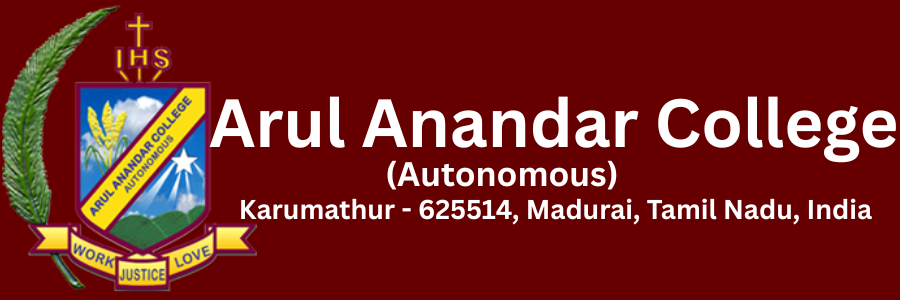- Home
- About us
- Administration
- Academics
- Research
- Student Support
- Outreach
- Alumni
- Admissions
- AAC Portal
- Contact

Arul Anandar Initiative for Social Education (ARISE)
ARISEARISE is an academic extension programme of Arul Ananadar College, which was introduced in the academic year 1995-1996 by Rev. Dr. D.L. Micheal Doss S.J., with the vision of taking the “University to Villages”. This initiative creates an opportunity for students to understand rural realities and to shape them into agents of social charge. It works in collaboration with Government Agencies, Community Based Organizations and with the Local Community and its Leaders. The Chairman of ARISE is Rev.Dr. Anbarasu M S.J., Principal, Arul Anandar College, Karumathur – 625 514. |
|
General Objectives |
|
|
AAC creates a sense of social concern in the minds students, through direct contact and exposure to rural community action and dedicated service to the poor. | |
Specific Objectives» To promote social concern through exposure to rural community. » To empower the rural people to find solutions to their day to day problems. » To provide opportunity for students to develop leadership skills and become agents of social change. |
|
Dynamics of functioningThe project aims at developing the neighborhood communities through literacy, health, sanitation and women empowerment. Students will work in the assigned areas for 60 hours in an academic year. Students in each department will work in teams of 10-15 members, with a team leader as their representative. The work of every team will be guided, monitored and evaluated. |
|
Role of Students» The students work as a catalyst in the community by concientising the vulnerable people and bring about attitudinal changes among them. » They inherit the quality that community service is part and parcel of their life. » Every student is expected to complete 60 hours of community work during their third and fourth semesters and if they fail to do so they have to repeat the whole program in the following academic year. » Students wear clean, decent clothes and conform to the rules of modesty. They (boys and girls) respect each other and follow the directions strictly with regard to their code of conduct off the campus. » Students are expected to be in the field before the time allotted to them. If the students are not available during the time of visit he/she is marked absent. » Students do not leave the field during the field visit hours. If they have to they get prior permission from the co-coordinator. » They do not use cell phones, chat in groups, use unpenitentiary words. Chewing of pan and bubble gum are be avoided. |
|
Role of staff in-chargeThe staff guide the students with regard to the following aspects: » They accompany the students and take part in the special programmes organized in the field and encourage the students. » The staff in-charge of each department maintain a file and document all the programmes conducted by students. » The staff in-charge collect the feedback from the students and report it to the co-ordinator. » They evaluate and monitor the student activities with the field staff. |
|
Final EvaluationThe final assessment will include regular attendance, group reports, evaluation by the staff in charge and the Co-ordinator of ARISE. The outreach is compulsory component for all the undergraduate second year students of the college and it is the part of the curriculum with a minimum of 60 hours and 1 credit. |
|
AwardsThe best department of Shift-I and Shift II will be honoured based on the activities carried out in the field and the outcome effort visible in the village. |
|
ACTIVITIES UNDERTAKEN IN THE COMMUNITY» Identification of the weak students and conducting remedial classes (in particular English Grammar and Maths). » Createing awareness among the students on health, hygiene and gender education (10th, 11, and 12th std). » Spoken English Classes. » Organize training program on career guidance, legal rights and consumers rights. » Conducting training programmes on communication, leadership, personality development and moral values. » Train them the habit of keeping the class and campus clean. » Makeing home visits and meet the parents when need arise. » Useing new teaching methodology (puzzles, cross words, quiz, role-play and skit) to reinforce learning. » Conduct training programmes for the school teachers » Organizing parent teachers association meetings. |
|
Youth welfare» Motivating the community youth to continue their education and encourage them to pursue higher studies. » Formation of youth clubs. » Organizing non-formal education and spoken English programme. » Disseminating information on the Government schemes and welfare programmes, which they can avail easily. » Conducting training programmes on leadership, personality development, career guidance, communication, self-employment and legal awareness. » Conducting awareness programmes on gender education (STD, HIV/AIDS) and substance abuse (Alcohol, Drugs and Pan) - RTI » Providing referral service to the networking organization working for the youth welfare. » Conducting sports, games and competitions. » Motivating the youth to involve in community welfare activities. |
|
Women Empowerment» Educating women on health issues (Gender education and communicable diseases. » Conducting training programmes on legal awareness, decision making, self-employment etc. » Provoiding Adult education program (Help them to teach and write basic mathematics). |
|
Report |
|
|
||||||||||||||||||||||||||||||||||||||||||||||||||||||||||||||||||||||||||||||||||||||||